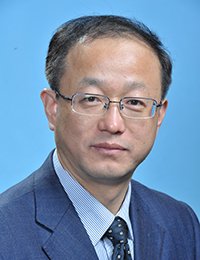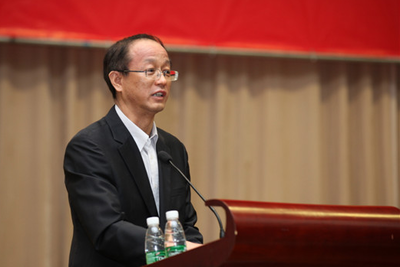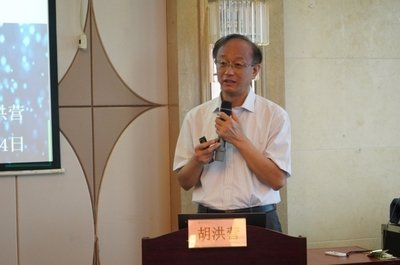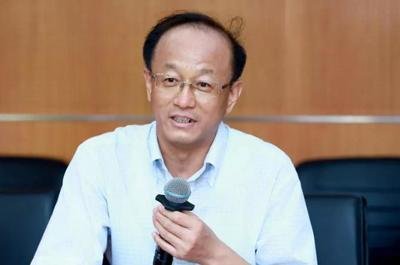胡洪营查看源代码讨论查看历史
| 胡洪营 |
 |
胡洪营,清华大学研究生院副院长[1]、环境学院环境生物教研所教授、 国家环境保护环境微生物利用与安全控制重点实验室主任[2],国家杰出青年科学基金与国家级教学名师奖获得者[3]。在科研方面,主要从事再生水安全利用理论与技术方面的研究,兼任国际标准化组织城镇水回用委员会(ISO TC282 SC2 )主席 、国际水协(IWA)再生水专家组成员、中国环境科学学会水环境分会副理事长、教育部环境科学与工程教学指导委员会秘书长、中国学位与研究生教育学会工科工作委员会秘书长以及《Water Research》副主编、《环境工程技术学报》副主编等学术职务;先后获教育部、建设部、环保部等省部级科技进步一等奖科技奖励多项。在教学方面,主讲的本科生课程"环境工程原理"被评为北京市和国家级精品课程,主持编写的《环境工程原理》被评为北京市精品教材;先后获北京市教育创新标兵称号、北京市教学成果特等奖、国家级教学成果二等奖和宝钢教育基金优秀教师特等奖等教学奖励[4]。
2021年4月23日,入选中国工程院2021年院士增选有效候选人名单。
基本信息
人物说明----清华大学研究生院副院长
国 籍 ---- 中国
职 业 ---- 教育科研工作者
主要成就----《环境工程原理》、《水质研究方法》 ,主讲"环境工程原理"被评为北京市和国家级精品课程
毕业院校----北京工商大学
研究方向----再生水安全利用、环境生物技术
个人简历
学历
1999. 1-1999.8 美国加州大学Berkeley分校访问学者
1991.04-1994.03 日本横滨国立大学工学研究科 物质工学(环境工程)博士
1989.04-1991.03 日本横滨国立大学工学研究科 物质工学(环境工程) 硕士
1988.10-1989.03 日本横滨国立大学工学部 环境工程 进修
1980. 9-1984.7北京工商大学(原北京轻工业学院)化学工程系环境工程学士
工作经历
2014.09至今 清华大学研究生院 副院长
2011.03至今 国家环境保护环境微生物利用与安全控制重点实验室主任
2010.07-2014.12 清华大学深圳研究生院 副院长
2006.10-2010.12 清华大学环境科学与工程系 环境生物学研究所所长
2001.03-2010.07 清华大学环境科学与工程系 副系主任
2000.04至今 清华大学环境科学与工程系(入选清华大学百人计划)教授
1997.04-2000.03 日本丰桥技术科学大学生态工程系 副教授
| 胡洪营 |
 |
1994.06-1997.03 日本丰桥技术科学大学生态工程系 助理教授
1984.8-1988.9 北京轻工业学院(现北京工商大学)化学工程系助教
教学
主讲本科生课程《环境工程微生物学》和《环境工程原理》(国家级精品课程)。主持编写了国家重点规划教材《环境工程原理》和土建学科重点规划教材《水处理生物学》,参加编写国家"十五"重点规划教材《环境微生物学》等。
研究方向
长期从事再生水安全利用理论与技术、环境微生物和生物技术领域的研究,主要研究方向包括再生水水质安全评价与风险控制、再生水水质标准、再生水高级氧化处理技术、再生水安全消毒技术、污水再生处理与资源能源生产耦合技术(能源微藻培养与利用)、水环境污染控制与生态修复、区域水资源循环利用系统与模式等。
围绕再生水水质保障与安全利用这一核心目标,通过主持和承担国家杰出青年基金项目、自然科学基金面上及重大国际合作项目、国家重点基础研究发展计划(973计划)课题、国家科技攻关计划课题等国家级科研项目,针对污水再生处理和再生水利用过程中的健康与生态风险产生机制、控制技术原理以及再生水生态毒性评价等开展了较为系统、深入的研究,提出了"水质生物风险与化学风险协调控制、污水再生处理工艺与再生水利用过程联合优化"、"区域水资源介循环利用模式"等污水再生利用安全保障技术路线,在该领域的研究不断深入。
科研项目
1) 再生水的安全性评价与控制技术(2013AA065205), 2012-2015, 863计划
2)城市污水再生利用科技需求与发展战略研究(51348011), 2013-2014, 基金委主任基金
3)徒骇河、马颊河流域水污染防治与水质改善技术集成与综合示范(2012ZX07209-004), 2012-2015, 国家重大科技专项"水专项"
4) 再生水生态储存的水质变化机制与调控原理(51138006),2012-2016, 国家自然科学基金重点项目
6) 消毒对再生水中有害基因的控制机制及强化技术研究(No.51078209), 2011-2013, 国家自然科学基金面上项目
8) 再生水景观与生态利用的风险产生机制及其控制原理(No.50825801), 2009-2012, 国家自然科学基金国家杰出青年科学基金项目
9) 高新城区水环境质量保障技术与综合示范(No.2008ZX07313-002), 2008-2010, 国家重大科技专项"水专项"
10) 再生水回用的风险控制技术研究(No. 2008AA062502), 2008-2011, 科技部国家"863"计划重点项目
11) 奥运景观水系水质保障综合技术与示范(2007BAC22B02), 2007-2009, 科技部科技支撑项目
12) 流域水环境修复与资源/能源生产耦合系统及其关键技术研究(No. 50721140017), 2006-2009, 国家自然科学基金重大国际合作项目
13) 持久性有机污染物的环境安全、演变趋势-持久性有机污染物生态风险评价模式和预警方法体系 (No.2003CB415007), 2003-2008, 科技部"973计划"项目
14) 再生水中隐孢子虫的风险分析及其去除方法研究(No.20477021), 2005-2007, 国家自然科学基金项目
15) 松花江重大污染事件爆炸现场排水管线污修复技术(2006BA618A-04), 2005-2007, 科技部应急科技专项
16) 松花江重大污染事件的生态环境影响评估与对策项目-松花江吉林段污染底质修复技术研究, 2005-2006, 环保部应急科技专项项目(财政部专项)
17)淄博市中心城区水环境质量改善技术与综合示范, 2003-2006, 科技部国家"十五"重大科技专项:"水污染控制技术与治理工程"
18) 城市污水再生利用的生态安全评价(No.20277025),2003-2005,国家自然科学基金资助项目
19) 再生水分类水质安全指标体系及准则研究(子课题)(No.2001BA610A-05B2), 2001-2003, 科技部"十五"科技攻关计划
科技奖励
2011年 第六届国家级教学名师奖
2010年 华夏建设科学技术奖一等奖[5]
| 胡洪营 |
 |
2009年 宝钢教育基金优秀教师特等奖
2008年 国家环境保护科学技术奖一等奖
2008年 国家自然科学基金委,杰出青年基金
2008年 国家精品课程《环境工程原理》
2007年 四川省科技进步一等奖
2006年 教育部科技进步一等奖
2005年 建设部华夏建设科学技术奖一等奖
2004年 获北京市教育创新标兵称号
出版著作
1)胡洪营等著:水质研究方法,科学出版社,2015年3月
2)胡洪营等著:再生水水质安全评价与保障原理,科学出版社,2011年3月
3)胡洪营等译:藻类生物质能源--基本原理、关键技术与发展路线图,科学出版社,2011年10月
4)胡洪营等译:污水再生利用指南,化工出版社,2008年5月
5)胡洪营,张旭,黄霞,王伟合编:环境工程原理(第二版),高等教育出版社,2011年6月。
6)顾夏声,胡洪营,文湘华,王慧:水处理生物学(第四版),建筑工业出版社,2006年5月。
7)环境微生物学,主编:王家玲,高等教育出版社,2003年(参编)。
学术兼职
国际标准化组织ISO TC282 SC2 城镇水回用技术委员会主席(2014.08-)
全国工程教育专业认证协会环境类专业认证分委员会专家兼副秘书长(2012年-)
中国环境科学学会理事(2012-)
国家 "水体污染控制与治理科技重大专项"滇池流域专家组专家(2012-)
国家 "水体污染控制与治理科技重大专项"河流主题专家组专家(2008-)
Member of Management Committee of IWA Water Reuse Specialist Group (WRSG) (2008.9-)
教育部高等学校环境科学与工程专业教学指导委员会秘书长(2006-)
教育部高等学校环境工程专业教学指导分委员会秘书长(2006-2013)
中国环境科学学会水环境分会副理事长(2004年-至今)
全国勘察设计注册环保工程师执业资格考试专家组成员(2004年-)
《Water Research》副编辑(2005.10-)
| 胡洪营 |
 |
《环境工程技术学报》副主编(2011-至今)
学术成果
代表性专著
1)胡洪营等著:水质研究方法,科学出版社,2015年3月
2)胡洪营等著:再生水水质安全评价与保障原理,科学出版社,2011年3月
3)胡洪营等译:藻类生物质能源--基本原理、关键技术与发展路线图,科学出版社,2011年10月
4)胡洪营等译:污水再生利用指南,化工出版社,2008年5月
5)胡洪营,张旭,黄霞,王伟合编:环境工程原理(第二版),高等教育出版社,2011年6月。
6)顾夏声,胡洪营,文湘华,王慧:水处理生物学(第四版),建筑工业出版社,2006年5月。
7)环境微生物学,主编:王家玲,高等教育出版社,2003年(参编)。
代表性论文
1)Lin-Lan Zhuang, Yin-Hu Wu, Xiao-Jie Shi, Tian-Yuan Zhang and Hong-Ying Hu (2015) Using ozonation to eliminate the inhibition of soluble algal products (SAP) of Scenedesmus sp. LX1 on its growth in microalgal cultivation for biomass/bioenergy production, Water Science & Technology: Water Supply, 15.5, 1034-1039
2)Yin-Hu Wu, Yin Yu and Hong-Ying Hu (2015) Microalgal growth with intracellular phosphorus for achieving high biomass growth rate and high lipid/triacylglycerol content simultaneously, Bioresource Technology, 19,374-381
3)Wen-Long Wang, Qian-YuanWu, Zheng-Ming Wang, Li-Xia Niu, Chao Wang, Ming-Chao Sun and Hong-Ying Hu (2015) Adsorption removal of antiviral drug oseltamivir and its metabolite oseltamivir carboxylate by carbon nanotubes: Effects of carbon nanotube properties and media, Journal of Environmental Management, 162, 326-333
4)Wen-Long Wang, Qian-Yuan Wu, Zheng-Ming Wang, Hong-Ying Hu, Nobuaki Negishi and Masaki Torimura (2015) Photocatalytic degradation of the antiviral drug Tamiflu by UV-A/TiO2: Kinetics and mechanisms, Chemosphere, 131, 41-47
5)Wen-Long Wang, Qian-Yuan Wu, Chao Wang, Tao He and Hong-Ying Hu (2015) Health risk assessment of phthalate esters (PAEs) in drinking water sources of China, Environmental Science & Pollution Research, 22, 3620-3630
6)Yang Yang, Yun Lu, Qian-yuan Wu, Hong-ying Hu, Ying-Hua Chen and Wan-li Liu (2015) Evidence of ATP assay as an appropriate alternative of MTT assay for cytotoxicity of secondary effluents from WWTPs, Ecotoxicology and Environmental Safety, 122,490-496
7)Yu-Chen Pang, Jin-Ying Xi, Guo-Qiang Li, Xiao-Jie Shi and Hong-Ying Hu (2015) Prevalence of antibiotic-resistant bacteria in a lake for the storage of reclaimed water before and after usage as cooling water, Royal Society of Chemistry, 17, 1182-1189
8)Xin Tang, Qian-Yuan Wu, Xin Zhao, Huang Huang, Xiao-Jie Shi, Hong-Ying Hu (2014) A fingerprint analysis method for characterization of dissolved organic matter in secondary effluents of municipal wastewater treatment plant, Environ Sci Pollut Res., DOI 10.1007/s11356-014-3336-3
9)Xin Zhao, Huang Huang, Hong-Ying Hu, Chang Su, Ji Zhao, Shu-Ming Liu (2014) Increase of microbial growth potential in municipal secondary effluent by coagulation, Chemorsphere, 109, 14-19.
10)Fang Tang, Hong-Ying Hu*, Li-Juan Sun, Qian-Yuan Wu, Yan-Mei Jiang, Yun-Tao Guan and Jing-Jing Huang (2014) Fouling of reverse osmosis membranes for municipal wastewater reclamation: autopsy results from a full-scale plant, Desalination, 349, 73-79.
11)Lin-Lan Zhuang, Hong-Ying Hu*, Yin-Hu Wu, Ting Wang and Tian-Yuan Zhang (2014). A novel suspended-solid phase photobioreactor to improve biomass production and separation of microalgae. Bioresource technology, 153: 399-402.
12)Tian-Yuan Zhang, Yin-Hu Wu, Lin-Lan Zhuang and Hong-Ying Hu* (2014). Screening heterotrophic microalgal strains by using the Biolog method for biofuel production from organic wastewater. Algal Research, 6: 175-179.
| 胡洪营 |
 |
13)Tian-Yuan Zhang, Yin-Hu Wu and Hong-Ying Hu* (2014). Domestic Wastewater Treatment and Biofuel Production by using microalgae Scenedesmus sp. ZTY1. Water science & technology, 69: 2492-2496.
14)Yin Yu, Yin-Hu Wu, Shu-Feng Zhu and Hong-Ying Hu* (2014) The bioavailability of the Soluble Algal Products of different microalgal strains and its influence on microalgal growth in unsterilized domestic secondary effluent, Bioresource Technology, accepted.
15)Yin-Hu Wu, Hong-Ying Hu*, Yin Yu, Tian-Yuan Zhang, Shu-Feng Zhu, Lin-Lan Zhuang, Xue Zhang and Yun Lu (2014) Microalgal species for sustainable bioenergy production using wastewater as resource: A review, Renewable and Sustainable Energy Reviews, 33, 675-688.
16)Yin-Hu Wu, Yin Yu and Hong-Ying Hu* (2014) Effects of initial phosphorus concentration and light intensity on biomass yield per phosphorus and lipid accumulation of Scenedesmus sp. LX1, Bioenergy Research, 7, 927-934.
17)Yan Sun, Huang Huang, Ying Sun, Chao Wang, Xiaolei Shi, Hong-Ying Hu*, Takashi Kameya and Koichi Fujie (2014) Occurrence of estrogenic endocrine disrupting chemicals concern in sewage plant effluent, Frontiers of Environmental Science and Engineering, 8(1), 18-26.
18)Ying-Xue Sun, Yue Gao, Hong-Ying Hu*and Fang Tang (2014) Characterization and biotoxicity assessment of dissolved organic matter in RO concentrate from a municipal wastewater reclamation reverse osmosis system, Chemosphere, 117, 545-551.
19)Xin Tang, Qian-Yuan Wu, Xin Zhao, Ye Du, Huang Huang, Xiao-Lei Shi, Hong-Ying Hu*(2014) Transformation of anti-estrogenic-activity related dissolved organic matter in secondary effluents during ozonation, Water Research, 48: 605-612.
20)Xin Tang, Qian-Yuan Wu, Ye Du, Yang Yang, Hong-Ying Hu* (2014) Anti-estrogenic activity formation potential assessment and precursor analysis in reclaimed water during chlorination, Water Research, 48: 490-497.
21)Xin Zhao, Hong-Ying Hu*, Tong Yu, Chang Su, Hao-Chi Jiang and Shu-Ming Liu (2014) Effect of different molecular weight organic components on the increase of microbial growth potential of secondary effluent by ozonation, Journal of Environmental Sciences, 26(11), 2190-2197.
22)Fang Tang, Hong-Ying Hu*, Qian-Yuan Wu, Xin Tang, Ying-Xue Sun, Xiao-Lei Shi and Jing-Jing Huang (2013) Effects of chemical agent injections on genotoxicity of wastewater in a micro?ltration-reverse osmosis membrane process for wastewater reuse, Journal of Hazardous Materials, 260, 231-237.
23)Feng Zhang, Jinying Xi, Jing-Jing Huang and Hong-Ying Hu* (2013) Effect of inlet ozone concentration on the performance of a micro-bubble ozonation system for inactivation of Bacillus subtilis spores, Separation and Purification Technology, 114, 126–133.
24)Yan Sun, Huang Huang, Ying Sun, Chao Wang, Xiao-Lei Shi, Hong-Ying Hu*, Takashi Kameya and Koichi Fujie (2013) Ecological risk of estrogenic endocrine disrupting chemicals in sewage plant effluent and reclaimed water, Environmental Pollution, 180, 339-344.
25)Xin Zhao, Hong-Ying Hu*, Shuming Liu, Feng Jiang, Xiaolei Shi, Mingtang Li and Xueqiao Xu (2013) Improvement of the assimilable organic carbon (AOC) analytical method for reclaimed water, Frontiers of Environmental Science and Engineering, 7(4), 483-491.
26)Huang Huang, Qianyuan Wu, Tang Xin, Rui Jiang, Hong-Ying Hu* (2013) Formation of haloacetonitriles and haloacetamides during chlorination of pure culture bacteria, Chemosphere, 92, 375–381.
27)Tianyuan Zhang, Yu Yin, Yinhu Wu and Hong-Ying Hu* (2013) Inhibitory effects of soluble algae products (SAP) released by Scenedesmus sp. LX1 on its growth and lipid production, Bioresource Technology, 146, 643-648.
28)Tian-Yuan Zhang, Yin-Hu Wu, Shu-Feng Zhu, Feng-Min Li and Hong-Ying Hu* (2013) Isolation and heterotrophic cultivation of mixotrophic microalgae strains for domestic wastewater treatment and lipid production under dark condition, Bioresource Technology, 149, 586–589.
29)Huang Huang, Qian-Yuan Wu, Hong-Ying Hu*, William A. Mitch*(2012) Dichloroacetonitrile and dichloroacetamide can form independently during chlorination and chloramination of drinking waters, model organic matters and wastewater effluents, Environ. Sci. & Tech., 46(19): 10624-10631.
30)Yin-Hu Wu, Yin Yu, Xin Li, Hong-Ying Hu* and Zhen-Feng Su (2012) Biomass production of a Scenedesmus sp. under phosphorous-starvation cultivation condition. Bioresource Tech., 112: 193-198.
31)Jingjing Huang, Hong-Ying Hu*, Sunqin Lu, Yi Li, Fang Tang, Yun Lu and Bin Wei (2011) Monitoring and evaluation of antibiotic resistant bacteria at a municipal wastewater treatment plant in China, Environ. International, 42, 31-36.
32)Qian-Yuan Wu, Yi Li, Hong-Ying Hu, et al. Reduced effect of bromide on the genotoxicity in secondary effluent of a municipal wastewater treatment plant during chlorination. Environmental Science & Technology, 2010, 44(13):4924-4929.
33)Qian-Yuan Wu, Hong-Ying Hu, Xin Zhao, et al. Characterization and identification of antiestrogenic products of phenylalanine chlorination. Water Research, 2010, 44 (12): 3625-3634.
34)Xin Li, Hong-Ying Hu, Gan Ke and Yang Jia (2010) Growth and nutrients removal properties of a freshwater microalga Scenedesmus sp. LX1 under different kinds of nitrogen sources, Ecological Engineering, 36(4), 379-381.
35)Xin Li, Hong-Ying Hu and Yang Jia (2010) Lipid accumulation and nutrient removal properties of a newly isolated freshwater microalga, Scenedesmus sp. LX1, growing in secondary effluent , New Biotechnology, 27(1), 59-63.
36)Xin Li, Hong-Ying Hu, Ke Gan and Yingxue Sun (2010) Effects of different nitrogen and phosphorus concentrations on the growth, nutrient uptake, and lipid accumulation of a freshwater microalga Scenedesmus sp., Bioresource Technology, 101(14), 5494-5500.
37)Xue Zhang, Hong-Ying Hu, Yujie Men and Kirsten Seestern Christoffersen (2010) The effect of Poterioochromonas abundance on production of intra- and extracellular microcystin-LR concentration, Hydrobiologia, 652, 237-246.
| 胡洪营 |
 |
38)Xin Li, Hong-Ying Hu, Yang Jia and Yinhu Wu (2010) Enhancement Effect of Ethyl-2-methyl acetoacetate on Triacylglycerols Production by a Freshwater Microalga, Scenedesmus sp. LX1, Bioresource Technology, 101(24), 9819-9821.
39)Qianyuan Wu, Hong-Ying Hu, Xin Zhao and Yingxue Sun. Effect of chlorination on the estrogenic/anti-estrogenic activities of biologically treated wstewater, Environmental Science and Technology, 2009, 43 (13), 4940-4945.
40)Can Wang, Jinying Xi, Hong-Ying Hu and Yuan Yao. Stimulative effects of ozone on a biofilter treating gaseous chlorobenzene, Environmental Science and Technology, 2009, 43(24), 9407-9412.
41)Yingxue Sun, Qianyuan Wu, Hong-Ying Hu and Jie Tian. Effect of bromide on the formation of disinfection by-products during wastewater chlorination, Water Research, 2009, 43(9), 2391-2398.
42)Meiting Guo, Hong-Ying Hu, James R. Bolton and Mohamed Gamal El-Din. Comparison of low- and medium-pressure ultraviolet lamps: Photoreactivation of Escherichia coli and total coliforms in secondary effluents of municipal wastewater treatment plants, Water Research, 2009, 28(4), 1-7.
43)Meiting Guo, Hong-Ying Hu, Boltonb, James R, El-Dinb and Mohamed Gamal Comparison of low- and medium-pressure ultraviolet lamps: Photoreactivation of Escherichia coli and total coliforms in secondary effluents of municipal wastewater treatment plants, Water Research, 2008, 28(4), 1-7.
44)Li-sha Wang, Hong-Ying Hu and Chao Wang. Effect of ammonia nitrogen and dissolved organic matter fractions on the genotoxicity of wastewater effluent during chlorine disinfection, Environmental Science and Technology, 2007, 41(1), 160-165.
45)Li-sha Wang, Dong-bin Wei, Jie Wei and Hong-Ying Hu (2007) Screening and estimating of toxicity formation with photobacterium bioassay during chlorine disinfection of wastewater, Journal of Hazardous Materials, 141(1), 289-294
46)Feng-min Li, Hong-Ying Hu. Isolation and Characterization of a Novel Antialgal Allelochemical from Phragmites communis. Applied and Environmental Microbiology, 2005, 71(11): 6545-6553.
47)胡洪营, 许春华, 李锋民, 石磊. (2015). 区域水循环经济体系的构建与实践. 世界环境(2), 22-24.
48)胡洪营,孙艳,席劲瑛,赵婷婷(2015)城市黑臭水体治理与水质长效改善保持技术分析,环境保护,13,24-26。
49)胡洪营,吴光学,吴乾元,管运涛,李欢,陶益(2015)面向污水资源极尽利用的污水精炼技术与模式探讨,环境工程技术学报,5(1),1-6。
50)胡洪营, 石磊, 许春华, 李锋民 (2015) 区域水资源介循环利用模式:概念·结构·特征. 环境科学研究, 28(6),839-847。
51)胡洪营,席劲瑛,孙艳,赵婷婷,孙丽娟(2015)城市黑臭水体形成机制、评价方法和治理技术,水工业市场,6,17-21。
52)胡洪营,庞宇辰,黄晶晶,席劲瑛,郭美婷(2013)再生水紫外线消毒影响因素及控制措施,给水排水动态,39(2),I21-I24。
53)胡洪营, 赵文玉, 李轶, 陈亚松, 文嘉 (2012) 面向景观回用的污水处理厂工艺优化与水质安全保障成套技术研究与示范, 给水排水, 38(10), 23-27.
54)胡洪营,吴乾元,杨杨,王华同(2011)面向毒性控制的工业废水水质安全评价与管理方法,环境工程技术学报,1(1),46-51.
55)胡洪营*,李鑫,杨佳(2009)基于微藻细胞培养的水质深度净化与高价值生物质生产耦合技术,生态环境学报, 18(3), 1122-1127。
参考来源
- ↑ 胡洪营教授:城市水环境治理面临的课题与长效治理模式 ,中国城镇供排水协会
- ↑ 清华大学胡洪营教授莅临我校作学术报告 ,四川轻化工大学, 2021-04-12
- ↑ 《水回用导则》系列国家标准发布,胡洪营团队深度解读 ,腾讯, 2022-01-06
- ↑ “百年兰大·名家讲坛”第162场报告会——胡洪营教授 ,兰州大学, 2017-11-09
- ↑ 清华大学环境学院导师教师师资介绍简介-胡洪营 ,清华大学2020-02-14